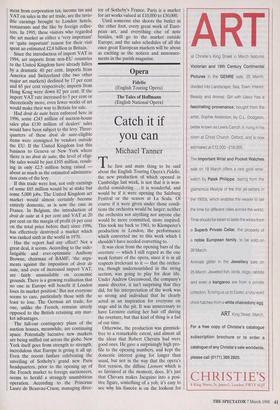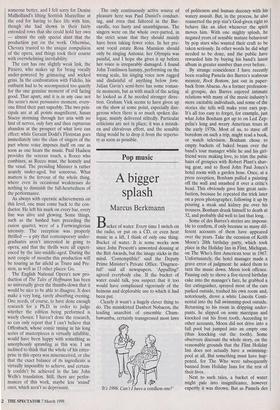Opera
Fidelio
(English Touring Opera)
The Tales of Hoffmann
(English National Opera)
Catch it if you can
Michael Tanner
The first and main thing to be said about the English Touring Opera's Fidelio, the new production of which opened in Cambridge last week, is not that it is won- derful considering ... it is wonderful, and would be if it were opening the Salzburg Festival or the season at La Scala. Of course if it were given under those condi- tions the orchestra would be larger; neither the orchestra nor anything nor anyone else would be more committed, more inspired. This took me back to 1961, to Klemperer's production in London, the performance which converted me to this work which I shouldn't have needed converting to.
It was clear from the opening bars of the overture — which I still regard as the one weak feature of the opera, since it is in all respects irrelevant to it — that the orches- tra, though undernourished in the string section, was going to play for dear life. Under Andrew Greenwood, the company's music director, it isn't surprising that they did, for his interpretation of the work was so strong and individual that he clearly acted as an inspiration for everyone on stage and in the pit. It was unnecessary to have Leonore cutting her hair off during the overture, but that kind of thing is a fad of our time.
Otherwise, the production was gimmick- free to a remarkable extent, and almost all the ideas that Robert Chevara had were good ones. He gave a surprisingly high pro- file to the opening numbers, and kept the domestic interest going for longer than usual, but not in the way that the opera's first version, the diffuse Leonore which is so favoured at the moment, does. It's just that Chevara makes Jacquino into a posi- tive figure, something of a yob; it's easy to see why his fiancée is on the lookout for someone better, and I felt sorry for Denise Mulholland's lilting Scottish Marzelline at the end for having to face life with him, though she had shown in their fairly extended rows that she could hold her own — almost the only special slant that the production put on the work. Otherwise, Chevara trusted to the unique compulsion of the opera, and things took their course with overwhelming inevitability.
The cast has one slightly weak link, the Pizarro, who makes up for being vocally under-powered by grimacing and wicked grins. In the confrontation with Fidelio, his outburst had to be accompanied too quietly for the one genuine moment of evil facing good. That apart, and it is in any case not the score's most persuasive moment, every- one fitted their part superbly. The two prin- cipals are at all points magnificent, Susan Stacey storming through her aria with no hint of nerves, only fury and then rapturous abandon at the prospect of what love can effect; while Geraint Dodd's Florestan goes immediately into the class of singers of the part whose voice imposes itself on one as soon as one hears the music. Paul Hudson provides the veteran touch, a Rocco who combines, as Rocco must, the homely and the venal. The presiding Minister is rather acutely under-aged, but sonorous. What matters is the fervour of the whole thing, where even its occasional weaknesses do nothing to diminish the full-heartedness of the performance.
As always with operatic achievements on this level, one must come back to the con- ductor. He left his mark on every bar, every line was alive and glowing. Some things, such as the hushed bars preceding the canon quartet, were of a Furtwanglerian intensity. The reception was properly thrilled — a pity that contemporary under- graduates aren't interested in going to opera, and that the thrills were all experi- enced by the late-middle-aged. During the next couple of months this production will be touring as far afield as Truro and Pre- ston, as well as 13 other places: Go.
The English National Opera's new pro- duction of The Tales of Hoffmann has been so universally given the thumbs-down that it would be nice to be able to disagree. It does make a very long, rarely absorbing evening. One needs, of course, to have done enough research for a Ph.D. in order to judge whether the edition being performed is wisely chosen. I haven't done the research, so can only report that I can't believe that Offenbach, whose comic timing in his long series of masterpieces is virtually infallible, would have been happy with something as amorphously sprawling as this was. I am inclined to think that the whole of his enter- prise in this opera was misconceived, or else that the exact balance of its ingredients is virtually impossible to achieve, and certain- ly couldn't be achieved in the late John Wells's translation. Still, there are perfor- mances of this work, maybe less 'sound' ones, which aren't so depressant. The only continuously active source of pleasure here was Paul Daniel's conduct- ing, and even that faltered in the Bar- carolle, too hasty and unambiguous. The singers were on the whole over-parted, in the strict sense that they should mainly have been taking fewer roles. In her pre- sent vocal estate Rosa Mannion should only be singing Antonia; her Olympia was painful, and I hope she gives it up before her voice is irreparably damaged. I found John Tomlinson hammy, performing on the wrong scale, his singing voice now ragged and disdainful of anything below forte. Julian Gavin's semi-hero has some roman- tic moments, but as with much of the acting he looked as if he needed stronger direc- tion. Graham Vick seems to have given up on the show at some point, especially dan- gerous when there is so much spoken dia- logue, mainly delivered stiltedly. Particular criticisms are not in place; it was a mistak- en and chivalrous effort, and the sensible thing would be to drop it from the reperto- ry as soon as possible.



























































 Previous page
Previous page